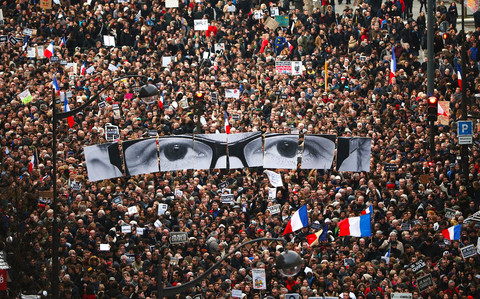By JACOB MCHANGAMA
Since European politicians post-Charlie Hebdo stood arm in arm in the
streets of Paris and pledged undying allegiance to the principle of free speech,
much has come to pass concerning that very freedom.
Starting with a (few) positives, parliament in both Norway and Iceland
has decided, as a mostly symbolic measure, to scrap each country’s respective
blasphemy laws.

A solidarity demonstration in Paris after the Charlie Hebdo attacks in January (Photo: Ben Ledbetter, Architect)
This is to affirm that freedom of expression must not surrender to
religious feelings that in some instances cause extremists to believe murder is
justified.
Unfortunately, however, there are significantly more negative
developments than positive ones. In fact whether dealing with terrorism,
extremism, racism, or privacy concerns, the European default solution seems to
involve chipping away at freedom of expression.
Unlike Norway and Iceland, Denmark has decided to uphold its blasphemy
ban, citing among other reasons fear of violent backlash from extremists at home
and abroad. This is hardly the most heroic response considering that 14 February
Copenhagen attacks were aimed specifically at a debate on blasphemy and a
prominent “blasphemer”.
The attacks against Charlie Hebdo prompted the magazine’s managing editor
to declare that it would no longer depict and publish the prophet Muhammed.
While that decision is certainly understandable given the level of risk, this
step would most likely never have been taken place had Charlie Hebdo not been
forced to pay the ultimate price for its previous publicist’s
courage.
As such, the French magazine has adopted the same editorial stance that
just about every other major Western print media had already accepted prior to
the attack; a stance where depictions of the Prophet form a red line not to be
crossed out of fear of violent retaliation.
On that basis, one might ask whether the Kouachi brothers did not indeed
fully achieve their goal by both “avenging” the prophet and forcing the hitherto
provocative and fearless Charlie Hebdo to submit and change its editorial line
in accordance with the Jihadist’s veto.
However it is not only islamists that seek to protect religion from
offense. The Austrian prosecution service recently announced an investigation
into whether Dutch politician Geert Wilders violated Austria’s law against
denigration of religion and hate speech.
This action was made in response to a speech on Austrian soil made by
Wilders in March. In it, as he has done so many times before, the prominent
politician compared the Koran with Mein Kampf and, (ironically but
characteristically for Wilder’s lack of principles), insisted that the former
book be banned. EU
Observer.
.jpeg)